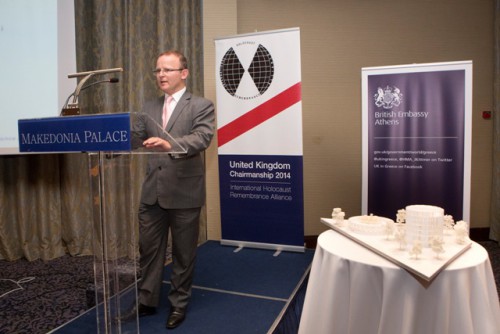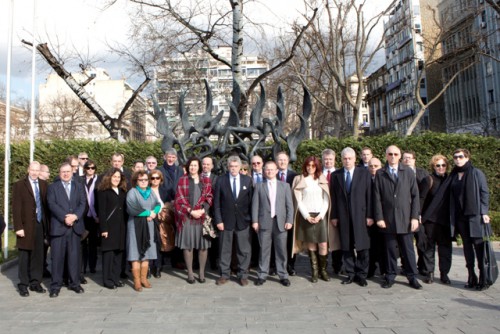3rd February 2015 Athens, Greece
International Holocaust Remembrance Day
It’s my pleasure to welcome as guests to this blog, Robert W. Peck, Ambassador of Canada (the last country chairing IHRA), and Eszter Sandorfi, Ambassador of Hungary (the next chair). They both share their thoughts on what the International Holocaust Remembrance Day means for them personally. I’m grateful to them for contributing in this way.
Since the UK assumed the chairmanship of the International Holocaust Remembrance Alliance (IHRA) in February of last year, my Embassy has pursued an active role, as the presiding country of the Alliance, here in Greece. In this, I was fortunate to follow Bob Peck, my Canadian counterpart, whose exemplary work in 2013-14 with the Jewish Communities of Greece, particularly in Ioannina, was inspiring.
I was clear from the start that I wanted to focus our geographical activities on Thessaloniki. This fantastic city, which I love greatly, has a remarkable Jewish history, which was almost entirely effaced by a combination of fire (in 1917) and Nazi barbarity (between 1941-4). Those of us who have read Mark Mazower’s wonderful book Salonica: City of Ghosts have an insight into how to read the absences and gaps in today’s city. The simple fact is that, when Greece liberated the city from the Ottoman Empire in 1912, the Jewish population was the largest of the three principal communities. Its presence in the city, since the expulsion of the Sephardim Jews by the Catholic Monarchs of Spain in 1492, is one of the most extraordinary migration stories in history. Granted by the Ottoman Sultan the right to settle in the largely depopulated city of Thessaloniki, the Jewish Community prospered, commercially, culturally and socially, to become the pulse of one of the Ottoman Empire’s most successful and cosmopolitan cities, known as “The Mother of Israel” and “The Jerusalem of the Balkans”. This rich civilisation was destroyed by Nazi barbarity in 1943, when almost the entire Jewish population, some 50,000 men, women and children, were deported to the death camp of Auschwitz-Birkenau. Only a thousand or so returned. The Nazis tried not only to exterminate the Jewish people, but also to wipe out their culture and their memory. Synagogues, the great Jewish cemetery, Jewish centres of learning were obliterated. The face of Thessaloniki was marked irremediably.
This year, we commemorate the 70th anniversary of the liberation of Auschwitz by the Red Army, on 27 January 1945. Tens of thousands of Greek Jews and many, many others were brutally murdered there. In commemorating these atrocities, it was my privilege on 24 January to lead a party of members of IHRA countries to Thessaloniki, to meet the Jewish Community and to learn about its rich history and the tragic events of 1943. On the Saturday evening, our commemoration brought together diplomats, members of the Jewish Community, leaders of the municipality and other citizens of Thessaloniki in an event with lectures and a moving performance by “La Rosa Enflorece”. I had the additional privilege of returning to the city a week later, on 1 February, to give the central address at the official Holocaust commemoration, which took place by the Holocaust Memorial in Freedom Square. For me, this was among the most moving experiences in my diplomatic career. We have published the speech I gave in Greek, together with a translation in English.
 Our year as chair of the IHRA is not yet quite over. With help from the Canadian and Romanian Embassies, we are sponsoring research into Greek attitudes towards the Holocaust. We will present these findings in March, shortly before Hungary takes over the rotating chairmanship.
Our year as chair of the IHRA is not yet quite over. With help from the Canadian and Romanian Embassies, we are sponsoring research into Greek attitudes towards the Holocaust. We will present these findings in March, shortly before Hungary takes over the rotating chairmanship.
For me and my team, it has been a true privilege and a great pleasure to work with the Jewish Communities of Greece. We have learned much and made many new friends. In these difficult times, we are determined to support them and to ensure that “NEVER AGAIN” means “NEVER AGAIN”.
Robert W. Peck – Ambassador of Canada to the Hellenic Republic
International Holocaust Remembrance Day is a day to reflect on the lessons of the Holocaust and consider actions that will prevent future acts of genocide.
Canada was affected in many ways by the tragedy of the Holocaust. Regretfully, Canada’s restrictive immigration policies during World War II largely closed the door on Jews seeking to flee Europe. Thankfully, the Canadian experience of the Holocaust was also one of resilience and hope. In April 1945, Canadian forces liberated the Westerbork Transit Camp in the Netherlands, including 900 Dutch Jews who were still interned there. As a nation, Canada has been profoundly shaped by approximately 40,000 Holocaust survivors, who resettled across the country after the war. Today, Canadians remember the Holocaust, commemorate its victims, and renew the commitment to fight against racism, discrimination and anti-Semitism.
Canada shares with other members a deep and abiding commitment to the International Holocaust Remembrance Alliance (IHRA) and the principles of the Stockholm Declaration upon which the IHRA is founded.
In 2010, Canada led the development of the Ottawa Protocol on Combating Anti-Semitism, an international action plan that will help nations measure their progress in the fight against anti-Semitism, and became the first country to sign the Protocol in 2011.
As a legacy of Canada’s Chairmanship of the IHRA (2013-2014), I am proud to have collaborated with numerous Greek partners in efforts that underscore the deep historical roots of the Jewish community in Greece but also remind future generations of the tragic history of the Holocaust.
The Canadian Embassy congratulates Ambassador John Kittmer of the United Kingdom and his team for their exceptional leadership over the past year. We also look forward to working with the Embassy of Hungary, which will assume the Chair in March 2015.
As the world commemorates the 70th anniversary of the Liberation of Auschwitz-Birkenau, I recall the words of Nobel Laureate Elie Wiesel who said: “We must take sides. Neutrality helps the oppressor, never the victim. Silence encourages the tormentor, never the tormented.”
Eszter Sandorfi – Ambassador of Hungary to Greece
It is a special honour for Hungary to assume the Chairmanship of the International Holocaust Remembrance Alliance (IHRA) in the year of the 70th anniversary of Auschwitz’s liberation. The Holocaust was a tragedy for our nation as a whole: every third victim of Auschwitz was of Hungarian origin. Therefore our chairmanship will concentrate on three main goals: the fight against anti-Semitism, the promotion of Holocaust education and raising awareness about the Roma genocide.
Besides the core activities of the IHRA – commemoration, education and research – I would add a fourth one: enhancing cultural ties. Hungary today gives home to the largest Jewish community in Central Europe and Budapest is experiencing a Jewish cultural renaissance. The second largest synagogue in the world operates in the Hungarian capital and the annual Jewish Summer Festival of Budapest has become the biggest Jewish cultural event in Europe. Besides promoting multicultural cohabitation, those events send a positive message to future generations.
Historically Hungarian Jews had a lot of contacts with the Jewish community in Greece, through intensive trade and business relations. I feel privileged to have established excellent relations and cooperation with the Jewish community in our host-country through a number of events during the last three years. I would especially like to mention the seminar in Athens dedicated to the life of Raoul Wallenberg, and the Wallenberg exhibition in Thessaloniki and in the Jewish Museum in Athens. In 2014 our Embassy joined the commemoration events of the Holocaust of the Jews of Ioannina. I must say it was an exhilarating moment to listen to the violin-soloist Édua Zádory’s performance of the “Kaddish” (by Maurice Ravel) during the memorial service in the Synagogue of Ioannina. Following the path of the UK-chairmanship I look forward to realizing our future activities in this spirit.
